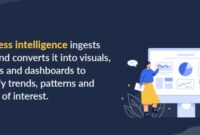Business intelligence engineer jobs are at the forefront of data-driven decision-making, empowering organizations with the insights they need to thrive in today’s competitive landscape. From healthcare to finance, these professionals play a crucial role in transforming raw data into actionable intelligence.
In this comprehensive guide, we delve into the exciting world of business intelligence engineers, exploring their responsibilities, skills, salary expectations, and the tools they utilize to unlock the power of data.
Overview of Business Intelligence Engineer Roles

Business Intelligence Engineers play a crucial role in data-driven decision-making within organizations. They are responsible for collecting, analyzing, and interpreting data to provide valuable insights that drive business strategy and improve operational efficiency.
These professionals are employed in various industries and sectors, including finance, healthcare, retail, manufacturing, and technology.
They work closely with stakeholders across the organization to identify business needs, develop data analysis plans, and create actionable reports and visualizations.
According to a recent study by LinkedIn, Business Intelligence Engineers are among the most in-demand professionals in the job market.
The demand for these professionals is expected to continue growing as organizations increasingly rely on data to make informed decisions.
Business intelligence engineers are responsible for designing, developing, and implementing business intelligence solutions that help organizations make better decisions.
To understand their role, it’s essential to have a clear understanding of business intelligence definition.
Business intelligence encompasses the processes and technologies used to transform raw data into actionable insights, enabling organizations to optimize operations, increase efficiency, and gain a competitive advantage.
Business intelligence engineers play a crucial role in leveraging these capabilities to drive business growth and success.
Required Skills and Qualifications
Business Intelligence Engineers require a combination of technical skills, analytical abilities, and soft skills to succeed in their role. Here are some of the key requirements:
Technical Skills and Programming Languages
- Data analysis and visualization tools (e.g., Power BI, Tableau, QlikView)
- Data mining and machine learning techniques
- SQL and NoSQL databases
- Python, R, or SAS for data manipulation and analysis
- Cloud computing platforms (e.g., AWS, Azure, GCP)
Educational Background and Certifications
- Bachelor’s or Master’s degree in Computer Science, Statistics, or a related field
- Certifications in data analysis or business intelligence (e.g., Tableau Certified Associate, Microsoft Certified Solutions Expert: Data Analytics)
Soft Skills and Analytical Abilities
- Strong analytical and problem-solving skills
- Excellent communication and presentation skills
- Business acumen and understanding of industry trends
- Ability to work independently and as part of a team
Job Market and Salary Expectations
The job market for Business Intelligence Engineers is highly competitive, with demand far exceeding supply. According to Glassdoor, the average salary for a Business Intelligence Engineer in the United States is around $110,000 per year.
Business intelligence engineer jobs are in high demand as organizations seek to leverage data for competitive advantage. To succeed in these roles, professionals need a deep understanding of business intelligence analytics and data science.
Business intelligence analytics and data science: a managerial perspective provides a comprehensive overview of these topics, empowering business intelligence engineers to make informed decisions and drive business growth.
Salary expectations can vary depending on factors such as experience, industry, company size, and geographic location.
Salary Ranges by Geographic Location
| Location | Average Salary |
|---|---|
| United States | $110,000 |
| United Kingdom | £60,000 |
| Canada | $90,000 |
| Australia | $120,000 |
| India | ₹8,00,000 |
Factors Influencing Salary Expectations
- Experience: Business Intelligence Engineers with more experience typically earn higher salaries.
- Industry: Salaries can vary depending on the industry in which the Business Intelligence Engineer is employed.
- Company size: Business Intelligence Engineers working for large companies often earn higher salaries than those working for small companies.
Job Growth and Career Advancement, Business intelligence engineer jobs
The job outlook for Business Intelligence Engineers is expected to remain strong in the coming years. As organizations increasingly rely on data to make informed decisions, the demand for these professionals is expected to continue growing.
Business intelligence engineer jobs are in high demand as organizations seek to leverage data to make better decisions. These professionals possess the skills to gather, analyze, and interpret data to provide insights that can help businesses improve their operations and profitability.
While business intelligence and business analytics are often used interchangeably, there are some key differences between the two disciplines.
Business intelligence focuses on providing insights into past and present data, while business analytics uses predictive models and statistical techniques to forecast future outcomes.
Business intelligence engineer jobs typically require a strong understanding of data analysis techniques, programming, and business intelligence tools.
Business Intelligence Engineers can advance their careers by gaining experience, pursuing additional certifications, and taking on leadership roles within their organizations.
Tools and Technologies Used: Business Intelligence Engineer Jobs
Business Intelligence Engineers use a variety of software and tools to perform their job duties. Here are some of the most commonly used tools:
| Tool | Purpose |
|---|---|
| Power BI | Data visualization and analysis |
| Tableau | Data visualization and analysis |
| QlikView | Data visualization and analysis |
| SQL | Database management and data retrieval |
| Python | Data manipulation and analysis |
| R | Data manipulation and analysis |
| SAS | Data manipulation and analysis |
| AWS | Cloud computing platform |
| Azure | Cloud computing platform |
| GCP | Cloud computing platform |
Emerging Technologies and Trends
The field of Business Intelligence is constantly evolving, with new technologies and trends emerging all the time. Some of the most recent trends include:
- Artificial intelligence and machine learning
- Cloud computing
- Big data
- Data visualization
- Self-service business intelligence
Best Practices and Methodologies
Business Intelligence Engineers follow a variety of best practices and methodologies to ensure the accuracy and effectiveness of their work. Here are some of the most common:
Data Analysis and Visualization

- Use clear and concise visualizations to communicate insights.
- Avoid overloading visualizations with too much data.
- Use appropriate chart types for the data being presented.
Data Modeling and Reporting
- Create data models that are accurate and efficient.
- Use appropriate reporting tools to create clear and informative reports.
- Test reports thoroughly before sharing them with stakeholders.
Successful Business Intelligence Projects
Successful Business Intelligence projects typically share the following characteristics:
- Clear business objectives
- Strong data foundation
- Effective use of technology
- Collaboration between stakeholders
- Ongoing monitoring and evaluation
Conclusive Thoughts
As the demand for data-driven insights continues to soar, business intelligence engineers are poised to shape the future of organizations across industries. Their ability to harness data, uncover patterns, and provide actionable recommendations makes them invaluable assets in the modern business world.
FAQ Compilation
What are the key responsibilities of a business intelligence engineer?
Business intelligence engineers are responsible for collecting, analyzing, and interpreting data to identify trends, patterns, and insights. They work closely with stakeholders to understand business needs and develop data-driven solutions.
What are the essential skills for a business intelligence engineer?
Technical skills such as SQL, Python, and data visualization tools are essential. Additionally, strong analytical and problem-solving abilities, as well as excellent communication and presentation skills, are highly valued.
What is the job outlook for business intelligence engineers?
The job outlook for business intelligence engineers is expected to grow significantly in the coming years due to the increasing demand for data-driven insights in various industries.




